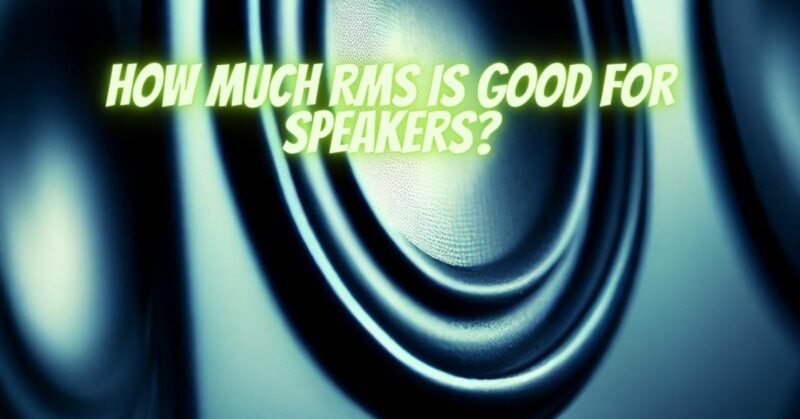When it comes to choosing speakers, one of the most crucial specifications to consider is the RMS (Root Mean Square) power rating. Understanding how much RMS power is appropriate for your speakers is essential for achieving the best sound quality, avoiding damage, and maximizing your audio experience. In this article, we will explore the factors that influence the ideal RMS power rating for speakers and guide you in finding the right match for your audio needs.
Understanding RMS Power Rating
The RMS power rating of a speaker indicates the amount of continuous electrical power (measured in watts) that it can handle without risking damage or degradation in performance. It serves as a critical reference point for matching speakers with amplifiers, ensuring that the combination operates harmoniously.
Factors Influencing the Ideal RMS Power
The ideal RMS power rating for speakers depends on several factors, each of which plays a role in determining the appropriate power match:
- Sensitivity (Efficiency): Speaker sensitivity is a measure of how efficiently a speaker converts electrical power into sound. Higher sensitivity speakers can produce greater volume with less power. If your speakers have high sensitivity, they can perform well with lower RMS power.
- Listening Environment: Consider the size and acoustic characteristics of the room where your speakers will be used. Larger rooms may require speakers with higher RMS power to fill the space adequately and provide a satisfying listening experience.
- Listening Preferences: Your personal listening preferences matter. If you enjoy listening at high volumes or demand dynamic, impactful sound, speakers with a higher RMS power rating may be more suitable.
- Music Genre: The type of music you typically listen to can influence your RMS power requirements. Music genres with a wide dynamic range or deep bass may benefit from speakers that can handle more power.
- Amplifier Quality: The quality of your amplifier or receiver is a crucial factor. A high-quality amplifier can deliver clean and undistorted power, enhancing the performance of your speakers. Conversely, a low-quality amplifier may require speakers with a higher RMS power rating to compensate for potential distortion.
- Dynamic Range: Consider the dynamic range of your audio source material. Speakers with a higher RMS power rating can better handle the dynamic peaks and provide a more dynamic and detailed sound experience.
Guidelines for Finding the Right RMS Power
To determine how much RMS power is suitable for your speakers, follow these guidelines:
- Speaker Sensitivity: Evaluate the sensitivity rating of your speakers. Higher sensitivity speakers (typically above 90 dB) can work well with lower RMS power. If your speakers have lower sensitivity, you may need an amplifier with more power to achieve the desired volume.
- Room Size: Match the power rating to your listening environment. Larger rooms generally require speakers with a higher RMS power rating to deliver sufficient sound coverage.
- Listening Volume: Consider your listening habits. If you frequently listen at high volumes or enjoy a robust sound experience, opt for speakers with a higher RMS power rating.
- Amplifier Quality: Ensure that your amplifier is of high quality and provides clean, undistorted power. A better amplifier can allow you to use speakers with a lower RMS rating effectively.
- Use RMS as a Guide: Use the RMS power rating as a guide, but don’t fixate solely on this specification. Consider the full range of factors discussed above to make an informed decision.
Finding the right RMS power rating for your speakers is a critical step in building an audio system that meets your needs and delivers exceptional sound quality. While the RMS power rating serves as a valuable reference, it should be considered in conjunction with other factors like sensitivity, room size, listening preferences, and amplifier quality. By carefully assessing these factors and striking the right balance, you can ensure that your speakers provide an immersive and enjoyable audio experience that aligns with your unique requirements.


